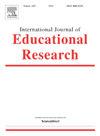我与世界:通过细胞电影对大学生对全球问题的看法的方法论探索
IF 2.5
3区 教育学
Q1 EDUCATION & EDUCATIONAL RESEARCH
引用次数: 0
摘要
21世纪20年代的大学生——Z世代——在科技的陪伴下成长,目睹了周围世界的缩小。他们接触全球问题的规模和频率都是前所未有的。然而,除了气候危机之外,文献中几乎没有帮助理解Z世代学生对全球问题的看法。本文报告了哈萨克斯坦两所大学的50名学生参与的关于全球问题的视觉参与式方法讲习班的试点研究。哈萨克斯坦的学生有不同的立场,这是探索他们对全球问题的看法的起点。在空间上,它们在前苏联空间的地理范围内,但与世界相连;暂时而言,他们是第一代从未亲身经历过苏联统治,却继续生活在其印记中的人。然而,哈萨克斯坦学生最关心的问题与全球同龄人相似:战争与冲突,以及环境问题。学生们制作了关于污染、全球变暖、破坏、网络欺诈、腐败、种族歧视和性别不平等的短片。细胞记忆的过程帮助学生思考与当地环境相关的全球性问题。视觉参与式方法为学生提供了重要的机会,不仅使他们理解全球问题,而且还与这些全球问题所带来的焦虑和担忧作斗争。可以通过使用参与式视觉方法,负责任地将社交媒体纳入课堂,以及通过对全球问题的公开讨论来增加学生的能动性。本文章由计算机程序翻译,如有差异,请以英文原文为准。
Me and the world: A methodological exploration of university students’ perspectives on global issues through cellphilms
University students in the 2020s – Generation Z – have grown up with technology and seen the world shrink around them. They have been exposed to global issues on a scale and with a frequency that is unprecedented. However, except in relation to the climate crisis, there is little in the literature to help understand Gen Z students’ perspectives on global issues. This article reports on a pilot study of visual participatory methods workshops about global issues with 50 students at two universities in Kazakhstan. Students in Kazakhstan have diverse positionalities, which was the starting point to explore their perspectives on global issues. Spatially, they are within the geography of the ex-Soviet space but connected to the world; temporally, they are one of the first generations never to have experienced Soviet rule firsthand yet who continue to live with its imprints. Nevertheless, the issues that most concern Kazakhstani students are similar to those of their global peers: war and conflict, and environmental issues. Students made cellphilms (short informational videos) about pollution, global warming, vandalism, cyber fraud, corruption, ethnic discrimination, and gender inequality. The process of cellphilming helped students think through global issues as they relate to their local environments. Visual participatory methods offer important opportunities for students not only to make sense of global issues but also to contend with the anxieties and concerns that these global issues present. Students’ agency could be increased through using participatory visual methods, responsibly incorporating social media in the classroom, and through open discussion on global issues.
求助全文
通过发布文献求助,成功后即可免费获取论文全文。
去求助
来源期刊

International Journal of Educational Research
EDUCATION & EDUCATIONAL RESEARCH-
CiteScore
6.20
自引率
3.10%
发文量
141
审稿时长
21 days
期刊介绍:
The International Journal of Educational Research publishes regular papers and special issues on specific topics of interest to international audiences of educational researchers. Examples of recent Special Issues published in the journal illustrate the breadth of topics that have be included in the journal: Students Perspectives on Learning Environments, Social, Motivational and Emotional Aspects of Learning Disabilities, Epistemological Beliefs and Domain, Analyzing Mathematics Classroom Cultures and Practices, and Music Education: A site for collaborative creativity.
 求助内容:
求助内容: 应助结果提醒方式:
应助结果提醒方式:


